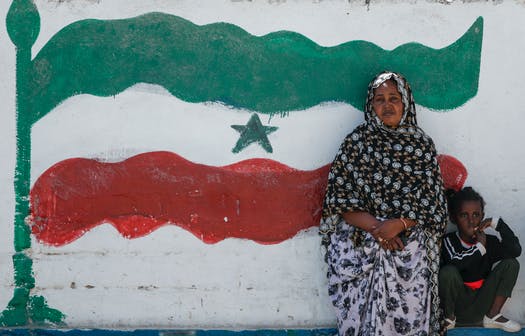On the eve of Ramadan, Abdi Warfa, a University of Minnesota professor, turned on the international news and saw a shocking scene. A massive fire ripped through the expansive open-air market in Hargeisa, Somaliland’s capital city, destroying hundreds of small businesses and his hometown’s economic engine.
His parents used to run a wholesale clothing shop among those stalls decades ago. Last summer, Warfa returned to buy school uniforms for his own children, who were visiting family in the area. His wife took the bus there once a week to buy fresh meat.
Then, seemingly overnight, the once-bustling commercial district was reduced to ruins.
“It’s a real disaster unfolding right before your eyes,” said Warfa, a biology assistant professor who moved to the United States in the 1990s. “Anyone who has walked through that market will understand what I’m talking about… Imagine a crowd of 7,000 people at the Mall of America.”
A week after a fire ravaged Waaheen Market, killing at least 28 people and causing an estimated $2 billion in property damage, members of the Twin Cities Somali community are banding together to raise funds for those who have lost their jobs.
Local imams are requesting donations at area mosques, and local business leaders have set up a GoFundMe page to help the Hargeisa mayor’s office, which is leading the reconstruction effort. Community groups held a fundraising dinner for iftar at the St. Paul Event Center on Saturday night, where 500 people could break their fast.
The April 1 fire, according to event organizer Abdirahman Kahin, was the city’s worst economic disaster since the civil war and would have far-reaching consequences beyond Somaliland’s borders. The market, which serves 4 to 5 million people annually, was gearing up for the holy month of Ramadan, which is traditionally the busiest season for Muslim merchants.
“This is where the money is made,” said Kahin, co-owner of the Afro Deli restaurant chain. “It reminds me of the State Fair. That [income] is important to people.”
In times of tragedy, relatives in Somalia rely on money sent from the Somali diaspora to help provide for them, he said. Minnesota now has the largest Somali population in the United States, with an estimated 70,000 Somalis living there. Somaliland is a country in Africa.
“These people are looking at us; they aren’t looking at NGOs or international donors,” said Kahin, who plans to send nearly $300,000 in aid back to the country. “We’re the first to respond to their emergency.”
Kahin acted quickly after seeing images of the fire on social media last weekend, calling an emergency meeting with community leaders the next day. The event’s organizers sold 500 tickets in less than 24 hours. Attorney General Keith Ellison of Minnesota and Representative Ilhan Omar of Minnesota have both agreed to attend.
Many of the guests have a strong connection to East Africa and have previously contributed to philanthropic efforts to combat a devastating drought that has lasted three seasons. According to Kahin, local organizations raised over $600,000 for the cause in just two years. Somali-Americans, on the other hand, are concerned that the latest disaster will result in rising inflation and take a decade to recover from.
“A lot of people in that region are just getting by,” said Mohamed Guled, CEO of Dauus, a Bloomington-based company that supplies baby formula, diapers, and pharmaceuticals to an estimated 200 shops at the Waaheen Market. “We want to help them get their businesses back up and running as quickly as possible.”
Those who are familiar with the area are relieved that no one was killed at the crowded market, where foot traffic can make navigating the streets — or finding an exit — difficult. “I can smell people’s breath when I go in there,” Guled explained. “I’m not sure how so many people were able to flee so quickly.” It’s nothing more than a misunderstanding.
Organizers say there is increased pressure on Somali-Americans to raise awareness about the toll of the fire and lift up those most impacted by the economic loss at a time when the international community’s attention is focused on the war in Ukraine.
“We have to fill that gap that the rest of the world would normally fill,” Warfa, the professor, explained. “People are putting their differences aside to lend a hand.”

